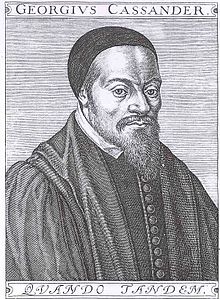Georg Cassander
Georg Cassander , also: Georg van Cadsant (born August 15, 1513 in Pittem (West Flanders), † February 3, 1566 in Cologne ) was a German theologian and humanist during the Renaissance .
Life
Cassander studied in Leuven and was a liberal arts teacher in Bruges and Ghent . In Bruges, Cassander met the learned and wealthy canon, Cornelis Wouters , with whom he traveled extensively. After a trip he enrolled in the theological faculty in Cologne in 1544 and in Heidelberg in 1546 and lived in Cologne from 1549, where he also taught.
Cassander and Wouters probably discovered in the library of Werden Abbey around 1554 a copy of the Gothic Bible of Bishop Wulfila , which contains the four Gospels in Gothic and Anglo-Saxon translations. The translation took place between 370 and 380, the traditional copy was made in Ravenna 500 to 520.
From the 50s of the 16th century he worked as an advisor to Wilhelm the Rich , Duke of Jülich-Kleve-Berg in Düsseldorf. Wilhelm the Rich pursued a policy of religious tolerance in his duchy during the times of religious wars and persecution. In this context, Cassander tried in his numerous writings to bridge the differences between Catholics and Protestants - old mistakes should be eliminated instead of taken up as a reason for separation. His main works, which he published in the last years of his life, were criticized by both religious camps. A prominent opponent of his teaching was the Löwener theologian Johann Hessels .
Cassander (and Wouters) belonged to a group of scholars from the Catholic Spanish Netherlands who came to the Klevian city of Duisburg from 1552 to teach in a grammar school founded there by the city council and Duke Wilhelm from 1559. The most famous scholar was the famous cartographer Gerhard Mercator , others Johann Otho and Johannes Molanus . At that time (1558) Cassander owned a house in Duisburg. The establishment of the grammar school was to be followed by the establishment of a university in Duisburg, but this did not happen at first. Probably because of this, Cassander went back to Cologne, where he died in 1566.
“On behalf of the Duke of Kleve and requested by Emperor Ferdinand , in 1564 he wrote an expert opinion on a possible union of Catholics and Protestants, in which he advocated the admission of the lay chalice and the marriage of priests. At this point, however, the development had already passed such ideas. (...) He had immortalized himself on Johannes Corputius' plan with a few elegiac verses. "
Works
The directory of the 16th century prints published in the German-speaking area lists 51 entries on Cassander, including:
- HYMNI ECCLESIASTICI, PRAESERTIM QVI AMBROSIANI DICVNTVR, MVLtis in locis recogniti, et multorum Hymnorum acceßione locupletati. Cum Scholijs, oportunis in locis adiectis, et Hymnorum Indicè. Cologne 1556
- DE SACRA COMMVNIONE CHRISTIANI POPVLI IN VTRAque panis & vini specie. Sítne eius restitutio Catholicis hominibus optanda, etiamsi iure diuino non simpliciter necessaria habeatur. Consultatio cuiusdam paci Ecclesiae optimè consultum cupientis. Cologne 1564
- GEORGII CASSANDRI DE ARTICVLIS RELIGIONIS INTER CATHOLICOS ET PROTESTANTES CONTROVERSIS CONSVLTATIO, AD ... IMPERATORES AVGVSTOS FERDINANDVM I. ET MAXIMILIANVM II. Cologne 1577
literature
- Paula Bröder: Georg Cassander's attempts to mediate between Protestants and Catholics . Düsseldorf 1931 (plus Marburg, Phil. Diss.)
- John Patrick Dolan: The Influence of Erasmus, Witzel and Cassander in the church ordinances and reform proposals of the United Duchees of Cleve during the middle decades of the 16th century. Münster / Westf .: Aschendorff 1957 (Reformation history studies and texts; H. 83)
- Daniel Gaschick: Is Cassander joking? The correspondence between Georg Cassander (1513–1566) and Georg Witzel (1501–1573). In: Church history author collective (ed.): Church history - Piety history - Regional history (FS Barbara Henze). Remscheid 2008. 97-114.
- Friedrich Wilhelm Bautz : Georg Cassander. In: Biographisch-Bibliographisches Kirchenlexikon (BBKL). Volume 1, Bautz, Hamm 1975. 2nd, unchanged edition Hamm 1990, ISBN 3-88309-013-1 , Sp. 949-950.
- Robert Haaß : Cassander, Georg. In: New German Biography (NDB). Volume 3, Duncker & Humblot, Berlin 1957, ISBN 3-428-00184-2 , p. 166 ( digitized version ).
- Leonard Ennen : Cassander, Georg . In: Allgemeine Deutsche Biographie (ADB). Volume 4, Duncker & Humblot, Leipzig 1876, pp. 59-61.
Individual evidence
- ↑ Stolberg-Wernigerode, Otto zu: Neue deutsche Biographie, Vol .: 3, Bürklein - Ditmar, Berlin, 1957, p. 166
- ↑ Archived copy ( memento of the original dated November 7, 2017 in the Internet Archive ) Info: The archive link was inserted automatically and has not yet been checked. Please check the original and archive link according to the instructions and then remove this notice.
- ^ Roden, Günter von: Geschichte der Stadt Duisburg Duisburg (5) 1980, vol. 1, p. 262 and ders .: Duisburg 1566 (Duisburger Forschungen vol. 6) Duisburg 1964, p. 63f.
- ↑ Cf. Regest of May 24, 1564 in: Anton Ritter von Perger : Excerpt from King Maximilian II's Copey Book of 1564 . In: Archive for customer Austrian history sources 31 (1864), pp. 193–272, esp. No. 158, p. 229 ( Google Books ).
- ↑ Literal copy from: Milz, Joseph: Geschichte der Stadt Duisburg, Vol. 1 Duisburg 2013, p. 267
| personal data | |
|---|---|
| SURNAME | Cassander, Georg |
| ALTERNATIVE NAMES | Cadsant, Georg van |
| BRIEF DESCRIPTION | German theologian and humanist |
| DATE OF BIRTH | August 15, 1513 |
| PLACE OF BIRTH | Bruges |
| DATE OF DEATH | February 3, 1566 |
| Place of death | Cologne |

